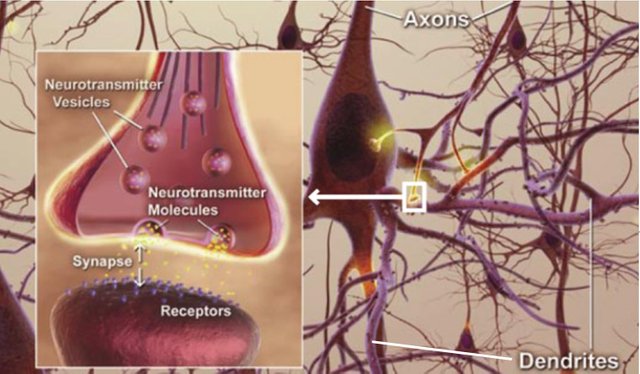What is a Key Purpose of Sleeping? To Help Us Learn!
Do you sometimes have problems with your memory or with retaining what you learned? The reason may be due to your sleep, or lack thereof.
A new study confirms that sleep recalibrates brain cells responsible for learning and memory. This enables animals to solidify or ingrain the lessons learned that day and make use of them when they wake up. Since humans are animals, this applies to us as well although confirmation in humans has not yet been done (if ever).

source
The study was conducted by scientists at Johns Hopkins, published in the journal Science on Feb. 3rd. Their findings confirm that the mouse brain, and presumably the human brain, can only store so much information before it needs to recalibrate itself through the process of sleep.
"Without sleep and the recalibration that goes on during sleep, memories are in danger of being lost."
Graham Diering, lead author, says that the current scientific understanding of learning is that information is contained within synapses which are the connections through which neurons communicate. The sending side of the synapse has neurotransmitters which are signaling molecules that are released by the brain cell as it fires, and on the other receiving end these signaling molecules are captured by receptor proteins. Each cell fires off its own neurotransmitters after it receives enough input through its own synapses. This is done over and over which allows messages or communication within the brain to occur.

source
Research on nonhuman animals shows that the synapses that receive the signals can be toggled in strength by removing receptor proteins. This can strengthen or weaken the synapses and allow the receiving neuron to get more or less input from other nearby signaling neurons.
Scientists also believe memories work the same way by being encoded in these synaptic changes. When the neuron activity becomes "maxed-out" and is constantly firing, they lose the capacity to convey information and receive new information, which will hinder learning and memory. Neurons don't often "max-out" because of a process that has been demonstrated in lab-grown neurons, called homeostatic scaling down. This weakens synapses in a neural network by a small percentage, while leaving relative strengths intact to permit continued learning and memory formation.
Homeostatic scaling down has been confirmed to take place during sleep in this new study. Sleeping mice studied showed a 20% drop in receptor protein levels which weakened their synapses, compared to mice that were still awake. The findings suggest a restructuring of mice brains every 12 hour to promote learning and memory function.
A protein called Homer1a is important for the regulation of sleep and wakefulness, as well as homeostatic scaling down. This protein had 250% higher levels in the sleeping mice than awake mice. When noradrenaline levels are high (which drives the brain to arousal and wakefulness), the Homer1a protein stayed away from the synapses, while lower levels had Homer1a collect at the synapses. Sleep-deprived mice were also kept awake, but a few were permitted to get recovery sleep. Those who slept had higher levels of Homer1a.
The need for sleep is controlled by adenosine which accumulates as we are awake and eventually sets in to provoke us to go to sleep. Caffeine is a psychoactive drug that interferes with adenosine and keeps us awake. Blocking adenosine during sleep with a drug results in Homer1a no longer increasing. Homer1a appears to regulate the levels of both noradrenaline and adenosine by acting like a "cop" to determine when the brain is quiet and to begin the "scaling down" process.
The study then explains how they reduced this scaling down. Drugging mice to prevent scaling down tested their ability to remember. While they were given a shock in an certain environment where they learned not to move or else get shocked, they were then returned to the area or a new area later on. Mice that were given the drug, vs. others that weren't, showed a 40% increase in the amount of time they stayed motionless to avoid a shock in the cages they were familiar with, but also showed a 13% increase in being motionless in a new area. Mice who were drugged had a hard time to distinguish between the memories of which cage they received a shock in, so they just stayed frozen to prevent getting a shock in their confused state.
This shows how the learning ability is affected by the homeostatic scaling down process, and how it only occurs during sleep. Sleep then isn't really a downtime for the brain, but a period when important work needs to be done.
Our modern life, despite the conveniences that are supposed to make life simpler, have tended to increase our preoccupation with tasks and increase the amount of time we stay awake versus going to sleep. The old days of getting up at sunrise and going to sleep at sunset aren't part of many modern day lives.
"This demonstrates why 'sleeping on it' can actually clarify your ideas."
References:
- Sleep deprivation handicaps the brain's ability to form new memories, mouse study shows
- Homer1a drives homeostatic scaling-down of excitatory synapses during sleep
Thank you for your time and attention! I appreciate the knowledge reaching more people. Take care. Peace.
If you appreciate and value the content, please consider:
Upvoting  , Sharing
, Sharing  or Reblogging
or Reblogging  below.
below.
Please also consider supporting me as a Steem Witness by voting for me at the bottom of the Witness page; or just click on the upvote button if I am in the top 50:


@krnel
2017-02-09, 7pm

Hello @krnel,
Congratulations! Your post has been chosen by the communities of SteemTrail as one of our top picks today.
Also, as a selection for being a top pick today, you have been awarded a TRAIL token for your participation on our innovative platform...STEEM.
Please visit SteemTrail to get instructions on how to claim your TRAIL token today.
If you wish to not receive comments from SteemTrail, please reply with "Stop" to opt out.
Happy TRAIL!

Thanks ;)
great reminder about how important getting a good nights sleep is. The lack of it messes with so much - dopamine levels which cause depression and a whole lot more. thanks for posting.
Where is lucid dreaming in all of this I wonder.
great article. Puts things into perspective. Just wrote an article on how to be more productive on less sleep if that interests you.
https://steemit.com/excercise/@giova/getting-more-done-on-less-sleep
cheers, keep up the great articles.
You didn't write that, you copy/pasted it.
ruh roooooh = busted by the Kernl
no i didn't. It was noted below the source of that.